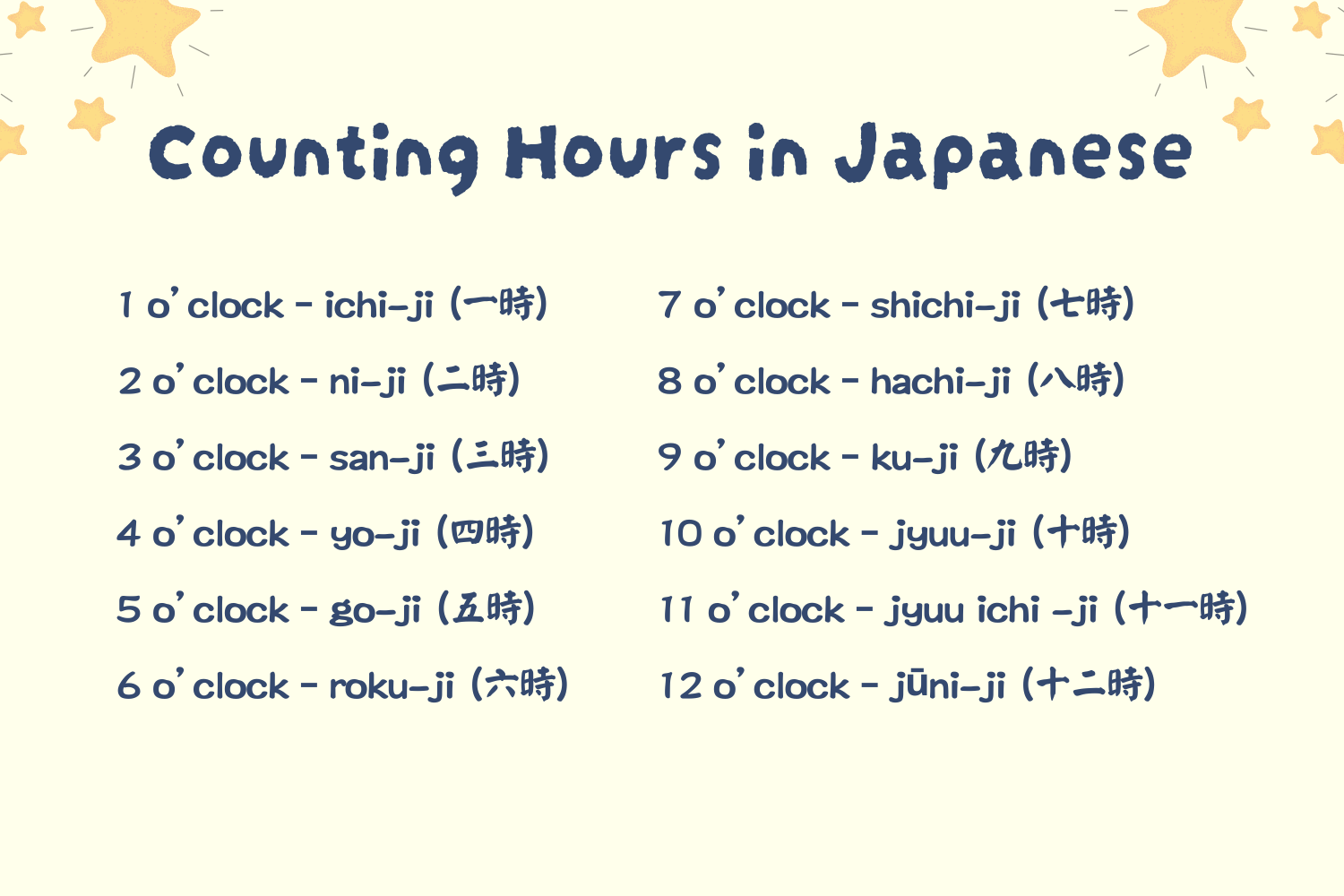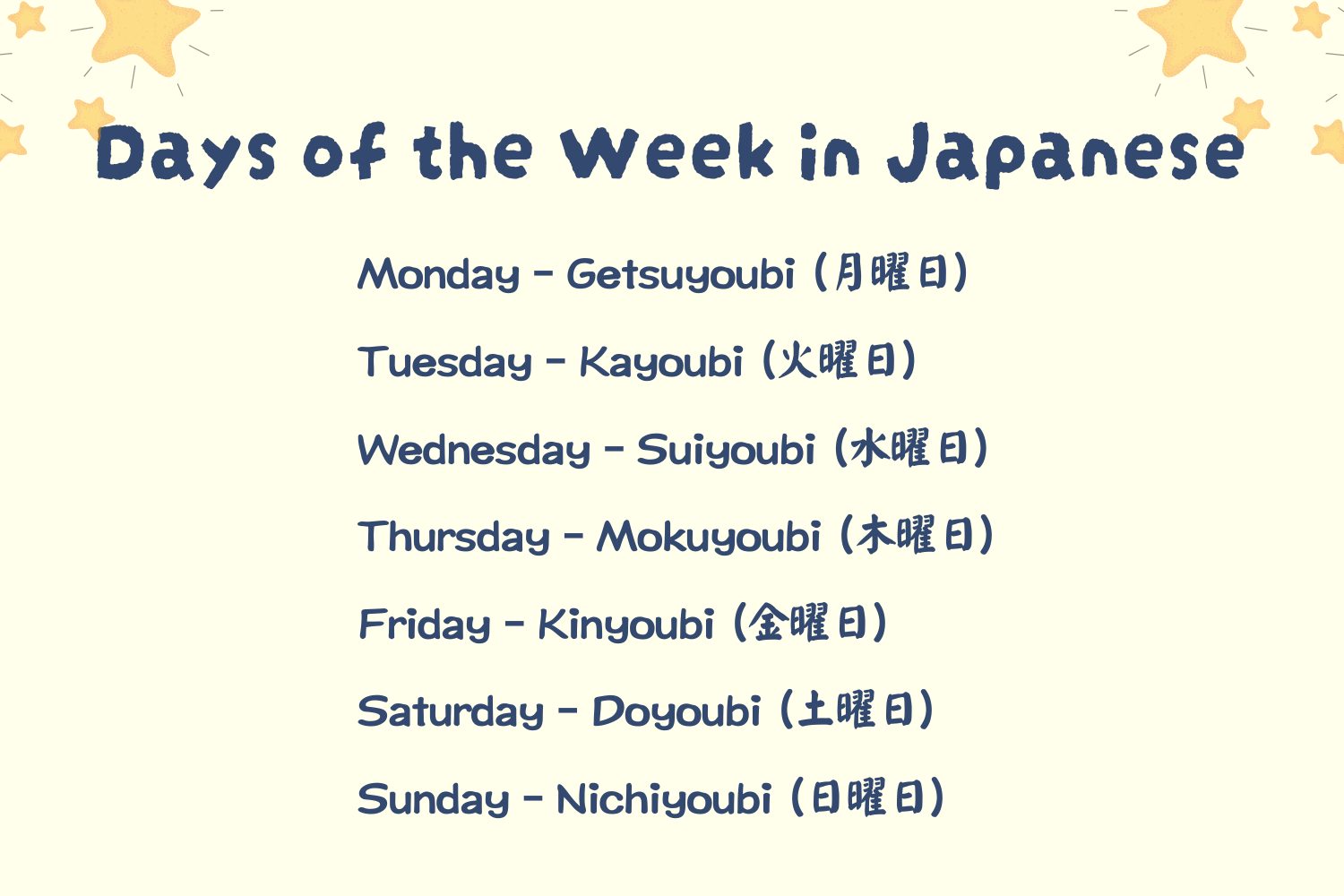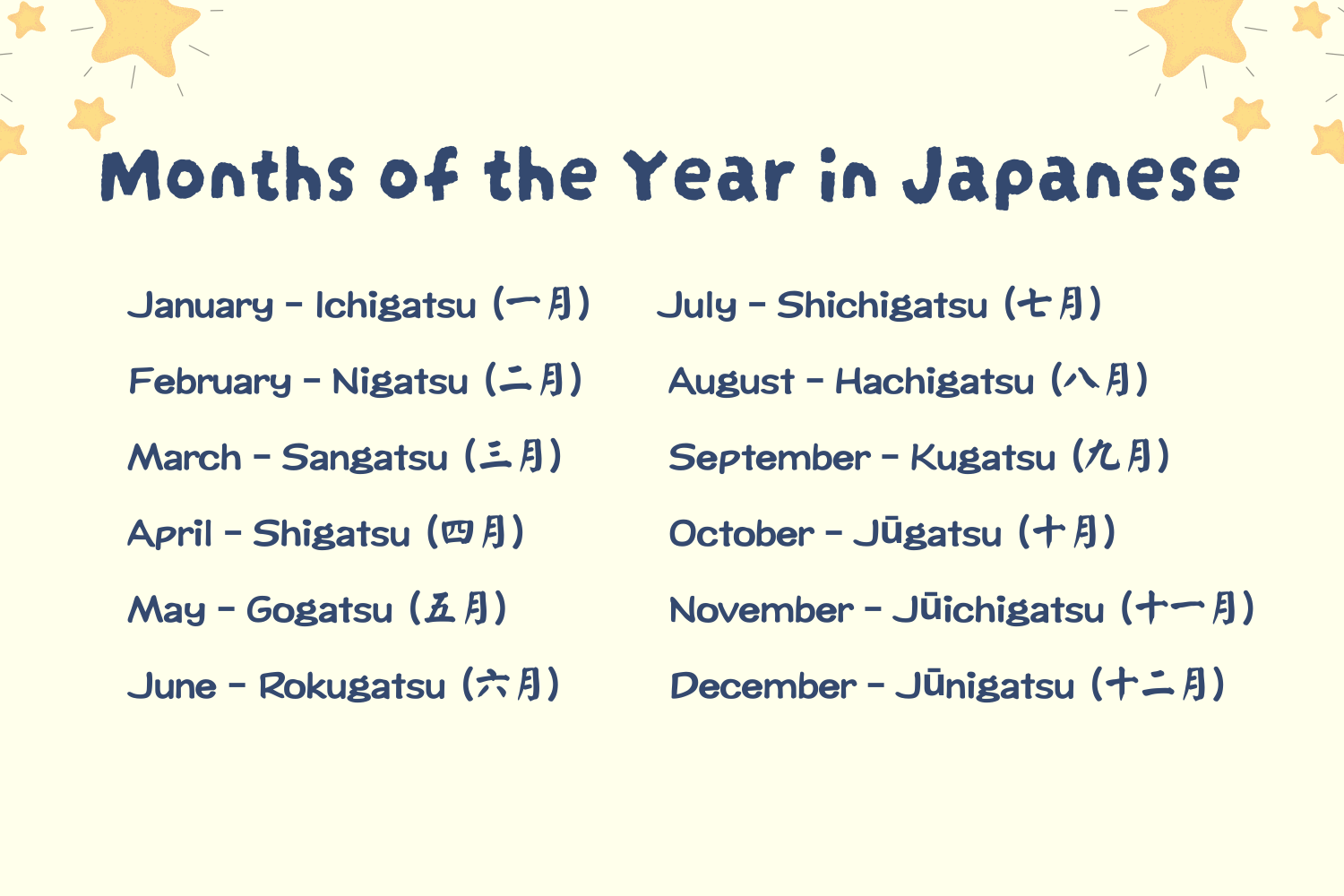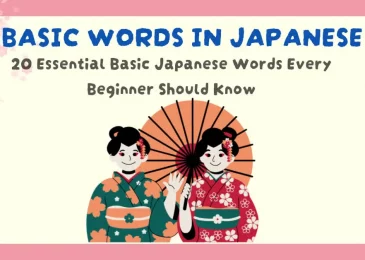When learning Japanese, one of the essential skills is understanding how to tell time. Knowing how to express hours, minutes, days, weeks, and months accurately in Japanese can help you in various situations, from everyday conversations to scheduling and planning. Mastering these expressions is not only practical but also deepens your understanding of Japanese language structure and cultural nuances.
This guide will walk you through everything you need to know about telling time in Japanese, from counting hours and minutes to discussing days, weeks, and months.
Counting Hours and Minutes in Japanese
The Japanese language uses unique terms and counting systems for hours and minutes. Let’s break down how to count each in Japanese.
Telling Hours

In Japanese, hours are counted using the term “ji” (時). The numbers 1 to 12 are used, similar to the standard 12-hour clock system.
1 o’clock – ichi-ji (一時)
2 o’clock – ni-ji (二時)
3 o’clock – san-ji (三時)
4 o’clock – yo-ji (四時)
5 o’clock – go-ji (五時)
6 o’clock – roku-ji (六時)
7 o’clock – shichi-ji (七時)
8 o’clock – hachi-ji (八時)
9 o’clock – ku-ji (九時)
10 o’clock – juu-ji (十時)
11 o’clock – juu ichi -ji (十一時)
12 o’clock – juu ni-ji (十二時)
Telling Minutes
For counting minutes, Japanese use “fun” (分) or “pun” (分) depending on the number. The pattern varies slightly with different numbers. Here’s a quick overview:
5 minutes – go-fun (五分)
10 minutes – jūppun (十分)
15 minutes – jūgo-fun (十五分)
30 minutes – san-jūppun (三十分) or han (半) for “half past”
Expressing Time of Day in Japanese
Different times of the day have specific terms in Japanese. Here are the main terms:
• Morning: Asa (朝)
• Noon: Hiru (昼)
• Evening: Yūgata (夕方)
• Night: Yoru (夜)
These terms help you clarify the general time of day without needing to specify an exact hour. For example:
• “I go jogging in the morning” – 朝にジョギングをします (Asa ni jogingu o shimasu).
• “I study Japanese in the evening” – 夕方に日本語を勉強します (Yuugata ni Nihongo o benkyou shimasu).
If you do need to specify a time, you can combine these terms with specific hours, like Gozen ku-ji (午前九時) for “9 AM” or Gogo roku-ji (午後六時) for “6 PM.”
Days of the Week in Japanese
In Japanese, the days of the week are represented by the suffix “yōbi” (曜日). Each day has a specific prefix:

• Monday – Getsuyoubi (月曜日)
• Tuesday – Kayoubi (火曜日)
• Wednesday – Suiyoubi (水曜日)
• Thursday – Mokuyoubi (木曜日)
• Friday – Kinyoubi (金曜日)
• Saturday – Doyoubi (土曜日)
• Sunday – Nichiyoubi (日曜日)
Here are some example sentences showing how to use these words in context:
• “I have a meeting this Monday” – 今週の月曜日に会議があります (Konshuu no getsuyoubi ni kaigi ga arimasu).
• “I will visit my friend next Friday” – 来週の金曜日に友達を訪問します (Raishuu no kinyoubi ni tomodachi o houmon shimasu).
By memorizing these days of the week, you can easily talk about schedules, make plans, or discuss events in Japanese.
Months of the Year in Japanese
In Japanese, months are named by combining the number of the month with “gatsu” (月), which means “month.” Here’s a breakdown:

1. January – Ichigatsu (一月)
2. February – Nigatsu (二月)
3. March – Sangatsu (三月)
4. April – Shigatsu (四月) (Note: April uses a unique reading)
5. May – Gogatsu (五月)
6. June – Rokugatsu (六月)
7. July – Shichigatsu (七月)
8. August – Hachigatsu (八月)
9. September – Kugatsu (九月)
10. October – Jūgatsu (十月)
11. November – Jūichigatsu (十一月)
12. December – Jūnigatsu (十二月)
Example Sentences:
• “In March” – 三月に (Sangatsu ni)
• “In August this year” – 今年の八月 (Kotoshi no hachigatsu)
Once you understand the number pattern in Japanese, forming the names of the months becomes straightforward.
Counting Days and Weeks in Japanese
Days in Japanese have unique names from the 1st to the 10th, as well as for certain other dates. Here’s the list:
Counting Days:
1. 1st – Tsuitachi (一日)
2. 2nd – Futsuka (二日)
3. 3rd – Mikka (三日)
4. 4th – Yokka (四日)
5. 5th – Itsuka (五日)
6. 6th – Muika (六日)
7. 7th – Nanoka (七日)
8. 8th – Yōka (八日)
9. 9th – Kokonoka (九日)
10. 10th – Tōka (十日)
11. 11th – Juuichinichi (十一日)
12. 12th – Juuninichi (十二日)
13. 13th – Juusannichi (十三日)
14. 14th – Juuyokka (十四日)
15. 15th – Juugonichi (十五日)
16. 16th – Juurokunichi (十六日)
17. 17th – Juushichinichi (十七日)
18. 18th – Juuhachinichi (十八日)
19. 19th – Juukunichi (十九日)
20. 20th – Hatsuka (二十日)
21. 21st – Nijuuichinichi (二十一日)
22. 22nd – Nijuuninichi (二十二日)
23. 23rd – Nijuusannichi (二十三日)
24. 24th – Nijuuyokka (二十四日)
25. 25th – Nijuugonichi (二十五日)
26. 26th – Nijuurokunichi (二十六日)
27. 27th – Nijuushichinichi (二十七日)
28. 28th – Nijuuhachinichi (二十八日)
29. 29th – Nijuukunichi (二十九日)
30. 30th – Sanjuunichi (三十日)
31. 31st – Sanjuuichinichi (三十一日)
Counting Weeks:
For counting weeks in Japanese, the following terms are used:
• One week – Isshuukan (一週間)
• Last week – Senshuu (先週)
• This week – Konshuu (今週)
• Next week – Raishuu (来週)
• Two weeks – Nishuukan (二週間)
• Three weeks – Sanshuukan (三週間)
Example Sentences:
• “The 3rd day of the month” – 三日 (Mikka)
• “Next week” – 来週 (Raishuu)
Learning these terms allows for accurate date expressions, enhancing clarity in scheduling and planning in Japanese.
Asking and Answering Questions About Dates and Times
Learning to ask and answer questions about dates and times is essential for practical conversations. Here are some useful phrases:
“What day is it today?” – Kyou wa nanyoubi desu ka? (今日は何曜日ですか?)
Answer: Kyō wa getsuyōbi desu (今日は月曜日です) – “Today is Monday.”
“What month is it this month?” – Kongetsu wa nangatsu desu ka? (今月は何月ですか?)
Answer: Kongetsu wa sangatsu desu (今月は三月です) – “This month is March.”
These questions and responses will help you interact more confidently in daily situations.
Additional Vocabulary and Useful Phrases
Learning additional time-related vocabulary can help enrich your Japanese conversations.
Weekend – Shuumatsu (週末)
Monthly – Maitsuki (毎月)
Weekly – Maishuu (毎週)
Examples:
“This weekend” – Konkai no shūmatsu (今回の週末)“Early next month” – Raigetsu no hajime (来月の初め)
Familiarity with these phrases enhances your language skills and prepares you for a variety of conversational contexts.
Tips for Memorizing and Practicing Japanese Time Expressions
Here are some practical tips for memorizing and practicing Japanese time expressions:
• Use a Calendar: Mark each day in Japanese, using kanji for days of the week and dates. This will reinforce vocabulary through daily repetition.
• Practice with a Clock: Set the clock to different times and say them aloud in Japanese to become more comfortable with hours and minutes.
• Language Apps: Use tools like MochiKanji, which are specifically designed to help you memorize Japanese vocabulary, kanji, and expressions effectively.
Why Use MochiKanji to Learn Japanese Time Expressions?
MochiKanji leverages a Spaced Repetition System (SRS) to ensure you retain time-related vocabulary and kanji long-term. The app provides interactive quizzes and examples, helping you learn commonly used kanji for hours, days, and months. With MochiKanji, you can create personalized learning paths focused on specific topics like time expressions, ensuring you build skills that align with your language goals. Its gamified features make practice enjoyable and consistent—perfect for mastering tricky kanji like 分 (minutes) and 曜 (day of the week).
Whether you’re counting days, telling time, or discussing weekly plans, MochiKanji helps make Japanese time expressions second nature. Pairing it with traditional learning methods like calendars and clocks ensures a comprehensive and efficient study routine.
Through consistent practice, you’ll develop a natural sense of expressing time in Japanese.
Conclusion
Mastering time expressions in Japanese is a vital step toward fluency. By understanding how to tell hours, minutes, days, and months in Japanese, you open doors to better communication, improved understanding, and deeper cultural appreciation.
Whether it’s scheduling an appointment, making plans with friends, or simply understanding daily conversations, knowing how to express time accurately in Japanese will boost your confidence and improve your overall language skills. Practice daily, and soon enough, telling time in Japanese will become second nature.





